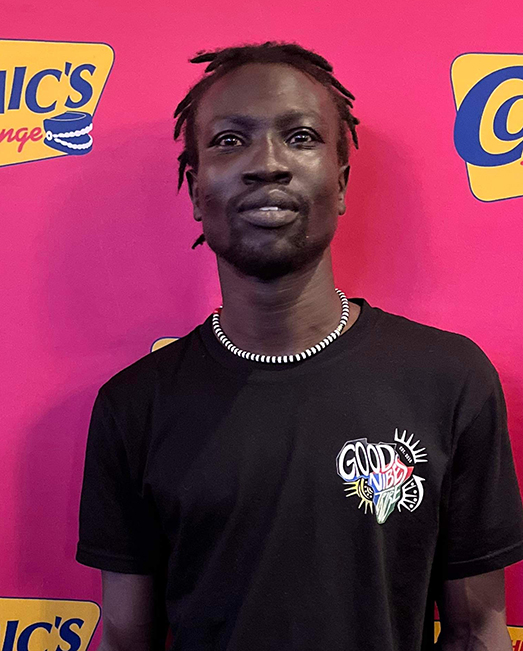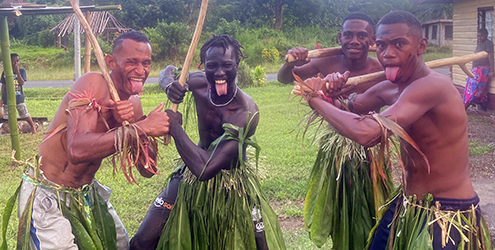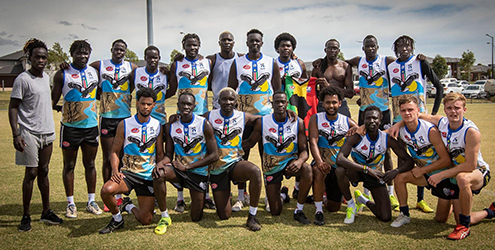Community
Copyright@ Australian Catholic University 1998-2026 | ABN 15 050 192 660 CRICOS registered provider: 00004G | PRV12008
Copyright@ Australian Catholic University 1998-2026 | ABN 15 050 192 660 CRICOS registered provider: 00004G | PRV12008

More than a decade ago, when Augustino Daw was an aspiring engineer studying at university in central Melbourne, he would regularly see a man hanging around with groups of teenagers. “I’d be walking out of uni and I’d see this guy there in the park,” he recalls, “and he’d be putting on a barbecue for the younger African kids or just standing there and having a chat with them, and I always wondered what he was doing and why he was there.”
One day, the intrigue got the better of him, so he approached the man.
“I walked up to him and said, ‘Hey, why do you always come and sit down with these young people? What exactly is it that you do?’”
The man, who was also of African descent, was more than happy to respond.
“So he replies, ‘I work in community development and my job is to help young people’,” says Augustino, a South Sudanese migrant who arrived in Australia as a 14-year-old in 2003.
“I’d never even really heard of the concept of community development or youth work, so I sat there and had this long discussion with him, and he explained that the organisation he worked with offered a helping hand to young people at risk of falling through the cracks. It was interesting to me, and this man really seemed committed to his job, so pretty soon after that I started volunteering there.”
The organisation was the Centre for Multicultural Youth (CMY), a not-for-profit that provides support to young Victorians from migrant and refugee backgrounds. In his late teens, Augustino took on a permanent role there, putting his childhood dream of becoming an aviation engineer to one side as he learnt the ropes as an outreach worker.
One of the reasons he felt so at home at CMY was that he could relate to the young people it aimed to support.
“I quickly realised that the kids who were being left behind were primarily from African backgrounds like me, and it was saddening to see that Australia hadn’t treated them so well,” says Augustino, who worked with CMY between 2008 and 2014.

Augustino on an ACU student placement in Fiji.
“My family and I have been fortunate in lots of different ways, and that really started to resonate with me, the fact that there were people out there who gave us a helping hand when we needed it. It felt right for me to give back, to spend my time helping others.”
Years on, Augustino is an experienced practitioner in the fields of youth work and community development, having worked for an array of not-for-profit organisations including Kids Off The Kerb and Cancer Council Victoria.
He’s also back at university and in the final year of his Bachelor of Youth Work at ACU, a course he enrolled in after completing a Diploma in Youth Work in 2019, allowing him to place theoretical knowledge alongside his practical expertise.
“As someone who has spent years working in community development, where I’d become so accustomed to the practical side of things, it was a real eye-opener to be exposed to the theoretical side,” he says.
“At times it was challenging because in class they’d talk about the theory and I’d say, ‘Well that’s not how it works in practice’. But my father has always told me that you should never stop learning, and with that in mind, gradually I started to see how theory and practice work together. It’s given me a much wider perspective and changed the way I view my work.”
Augustino remembers his childhood in Sudan like it was yesterday.
He describes himself as “one of the lucky ones” who lived in the country before the peak of the conflict in the Sudanese civil war.
“It was a happy childhood – we had a big family and lots of friends and I didn’t witness much of the war at all,” he says.
Augustino went to school in the city from an early age, enjoying his classes and progressing quickly. A few weeks before his eleventh birthday the family fled to Egypt, where they stayed for three years until arriving in Australia in early 2003.
With a worldly father who spoke English fluently, it was a relatively seamless transition for the Daw family.
“Before we left Egypt, my father explained a lot of things to us about Australia – the ‘dos and don’ts’, the culture shock we might experience as we adapted to a new place – so it wasn’t long before we became accustomed to the Australian way of life,” he says.
At the same time, Augustino regularly felt disconnected from his culture and heritage.
“There weren’t many Africans in Melbourne at the time, and as an outsider in such a new and different environment, sometimes you would get a bit homesick.”
As is the case with many migrants, sport provided a means of breaking down barriers.
“It gave me a way of fitting in,” says Augustino, whose love of sport came in handy when he was employed as a multicultural community ambassador with AFL Victoria.

Augustino (bottom row, third from right) in his footballing days.
“I got my coaching accreditation and started to deliver AFL clinics to multicultural communities in schools and community festivals, just to give them a taster of football and all the things it can offer.”
Augustino is a co-creator and former manager of Team South Sudan, which now competes in AFL International and has twice won the World 9s championship.
Over the years he has worked on many other projects aimed at young African migrants, including Be A Brother, an award-winning responsible drinking campaign led by Cohealth, a youth service where Augustino was a cultural support worker. He also played a role in the establishment of South Sudanese Australian Youth United, a grassroots not-for-profit that runs programs to empower South Sudanese youths.
“From the things I’ve seen in Australia, it’s clear that if you don’t find a sense of belonging or community as a young African, it’s more than likely you’ll fall through the cracks,” he says. “That why it’s really important to empower these young people, to give them mentors and opportunities to be engaged, to develop life skills and find connections.”
Looking back at his experiences in the not-for-profit sector over some 15 years, Augustino is thankful for the career opportunities provided to him. Even a mid-pandemic foray into engineering couldn’t sway his commitment to the field.
“I was offered a contract as a mechanical engineer at Alice Springs Airport, an opportunity to pursue the childhood dream that I’d always wanted, so I went ahead and did it,” he says.
But the lure of community work was too strong. While still in the Northern Territory, Augustino took on a role as a disability worker in Alice Springs, returning home to Melbourne six months later to begin his degree.
“I always say that I didn’t choose youth work and community development, it chose me,” says Augustino, who currently juggles study with parenthood and a management role with a youth disability service.
As for the future, he remains open to many possibilities. The only requirement is that he is helping other people. He’ll just continue on the journey that began all those years ago, when he met the man in the park in central Melbourne.
“It’s absolutely true that every now and then, every single person needs a helping hand,” Augustino says. “So I’ll just finish off my studies and see whether I can help somewhere and apply the skills I’ve acquired, whether that’s here in Melbourne or even overseas in a developing country like South Sudan. The world is my oyster, as the Aussies would say.”
Keen to offer a helping hand to young people with a career in youth work and community development? Explore the options.
Copyright@ Australian Catholic University 1998-2026 | ABN 15 050 192 660 CRICOS registered provider: 00004G | PRV12008